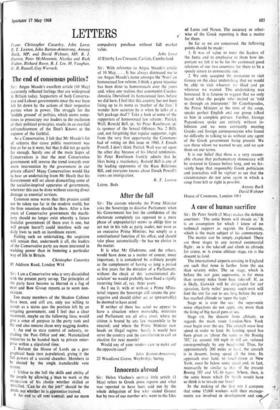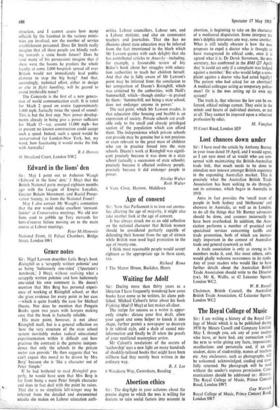A case of human sacrifice
Sir: Dr Peter Smith (3 May) makes the definite assertion: 'The sonic boom will invade us.' It is an assumption for which I know of no technical support as regards the Concorde, which is the main subject of his commentary.
The matter can be simply explained. There are three stages to any normal commercial flight : AB is the take-off and climb to altitude for cruise, Sc is cruise altitude stage, CD is the descent to land.
The international airports existing in England are such that none is farther from the sea than seventy miles. The AB stage, which is before the ssr goes supersonic, is far more than seventy miles from base take-off. If, as is likely, Gatwick will be designated for ssr ojeration, forty miles' journey south-west will find the SST far out to sea long before the SST has reached altitude to 'open the taps.'
Stage BC is over the sea : the supersonic noise objections do not apply any more than the firing of big naval guns at sea.
Stage co, the descent from altitude, as regards the main route London-New York must begin over the sea. The aircraft must lose speed in order to land. Its landing speed has been given as 'about the same as the Boeing 707,' i.e. around 160 mph in still air, reduced correspondingly by any head-wind. Thus, for approximately 200 miles at least, the aircraft is in descent, losing speed all the time. Its approach over land, to touch-down at New York, must be below sonic speed and, in fact, necessarily be similar to that of the present Boeing 707 and VC-10 types. Where, then, is the sonic boom which Dr Smith would have us think is to invade our lives?
In the making of the first ssr 1 compute that some 15,000 workers with their manage- ments are involved in development and con- struction, and I cannot assess how many officials by the hundred in the various minis- tries are involved, nor the number of service establishment personnel. Does Dr Smith really imagine that all these people are blindly rush- ing towards a sonic boom future? Does he (and many of his persuasion) imagine that if there were the booms he predicts the whole faculty at some 3,000 hospitals spread all over Britain would not immediately lead public clamour to stop the big bang? And that, accordingly, technical effort, either in design or else in flight handling, will be geared to avoid intolerable noise?
The Concorde is the first of a new genera- tion of world communication craft. It is rated for Mach 2 speed on cruise (approximately 1,400 mph, factually twice the speed of sound). This is but the first step. New power develop- ments already in being give a power sufficient for Mach 15—say, around 11,000 mph—but at present no known construction could accept such a speed. Indeed, such a speed would be unwarranted for London-New York, but, my word, how fascinating it would make the link with Australia!







































 Previous page
Previous page